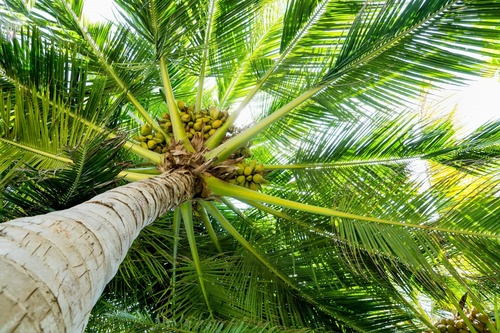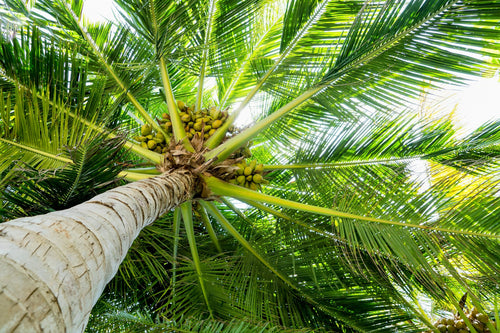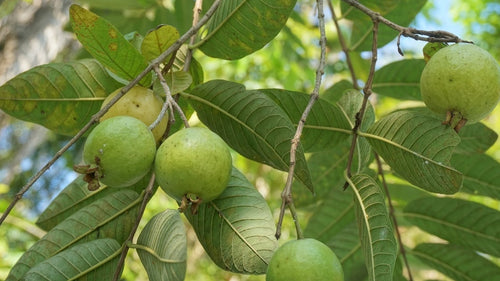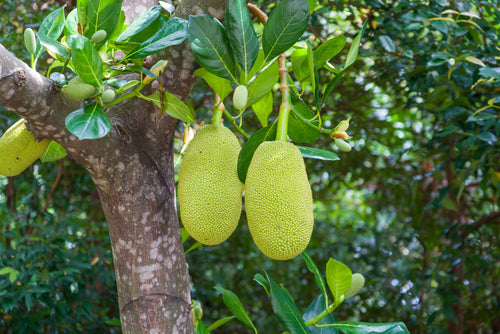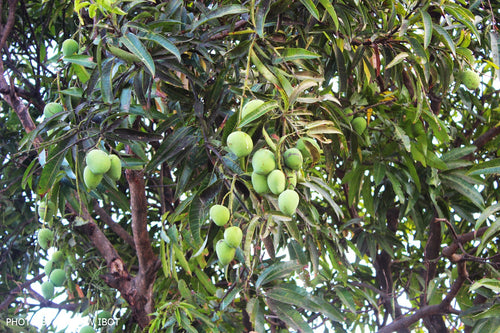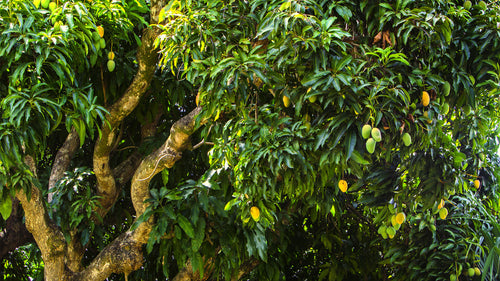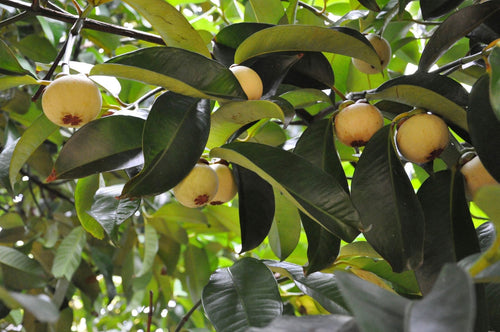Nurturing Leadership and Sustainability: Deloitte’s Agroforest Initiative for CFO Vantage
Deloitte's tree plantation initiative, integrated into their CFO Vantage Program, reflects the company’s dedication to sustainability and environmenta Read more
Project Update 1
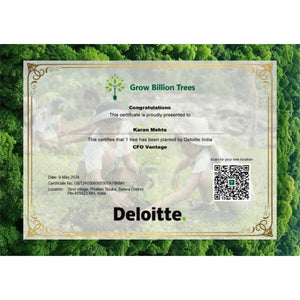
Digital Forest
Forest with 23 Trees planned
Want to plant your tree now?
Plant a Tree @ 299Nurturing Leadership and Sustainability: Deloitte’s Agroforest Initiative for CFO Vantage Program
Deloitte's tree plantation initiative, integrated into their CFO Vantage Program, reflects the company’s dedication to sustainability and environmental responsibility. The CFO Vantage Program is designed to equip emerging finance leaders with critical skills in competence, influence, and leadership, preparing them for the role of Chief Financial Officer. As part of this immersive experience, Deloitte organized a tree plantation activity under the agroforest concept.
This initiative focused on contributing to environmental sustainability by planting trees in a carefully chosen agroforest location. The program highlighted the symbolic role of environmental stewardship, seamlessly aligning with the core values of leadership and responsibility. Through this effort, Deloitte demonstrated its commitment to fostering long-term sustainability while enabling program participants to reflect on the broader impact of responsible leadership in both business and nature.
Tree Plantation Date
22nd May 2024
Plantation Location
Sahayadri Van, Girvi, Satara, Maharashtra 415523
Trees Planted
Total Count: 23 Trees
Species Name: Mango, Guava, Chiku, Jackfruit, Coconut
Forest Type: Agroforest
Deloitte's tree plantation initiative, organized as part of the CFO Vantage Program, was based on the agroforest concept, which combines the benefits of both agriculture and forestry to create sustainable ecosystems. This approach is particularly farmer-centric, as it enhances soil fertility, reduces erosion, and offers farmers additional income through the cultivation of diverse tree species alongside crops. The agroforestry model provides farmers with year-round revenue from both timber and non-timber products, improving their resilience to market fluctuations and climate change. By incorporating this model, Deloitte not only contributed to environmental sustainability but also supported local farmers by promoting practices that enhance productivity and long-term financial stability. This initiative aligns with the program's values, showcasing a holistic approach to leadership that integrates responsible business practices with tangible social and environmental benefits.
Advantages Of Agroforest
Enhanced Income Diversification for Farmers
Agroforestry offers farmers a steady income stream from both agricultural crops and forestry products. By integrating tree plantation with traditional farming practices, farmers can benefit from the sale of timber, fruits, nuts, and other non-timber forest products. This diversification reduces dependence on a single crop and creates financial stability, as farmers can turn to tree-based products when crop yields are low, providing an alternative source of income.
Improved Livelihood Resilience
In an era of fluctuating market prices and climate uncertainty, agroforestry enhances farmers' resilience by providing multiple revenue sources. Trees in agroforestry systems protect crops from extreme weather conditions such as droughts or floods, ultimately boosting the sustainability of farming practices. The combination of crops and trees allows farmers to recover more quickly from adverse environmental conditions, thus enhancing their long-term livelihood resilience.
Reduced Farming Costs
Trees in agroforestry systems contribute to lowering farming costs by reducing the need for chemical fertilizers and pesticides. The root systems of trees improve soil structure and fertility, enabling better water retention and reducing the need for irrigation. Additionally, trees act as natural pest control by providing habitat for beneficial insects. This reduces input costs for farmers, increasing profitability.
Environmental Sustainability
Agroforestry promotes biodiversity by creating diverse ecosystems that benefit both flora and fauna. The incorporation of trees into agricultural landscapes helps sequester carbon, mitigate soil erosion, and enhance water quality. These environmental benefits contribute to more sustainable agricultural practices, ensuring that the land remains productive for future generations.
Improved Soil Health
The deep-root systems of trees in agroforestry systems help to enrich soil nutrients and prevent erosion. By improving soil structure, trees enhance water retention and minimize the risks of drought and flooding. This results in healthier soils that support better crop yields, improving the productivity of the land in the long run.
Increased Carbon Sequestration
By planting trees as part of agroforestry systems, Deloitte's initiative contributes to the fight against climate change. Trees naturally sequester carbon dioxide from the atmosphere, helping to mitigate global warming. This added benefit plays an important role in fostering a more sustainable agricultural landscape, which aligns with broader global environmental goals.
Social and Community Benefits
Agroforestry initiatives also have a positive impact on local communities. By promoting sustainable farming, farmers can increase their social standing, improve community cooperation, and ensure that future generations inherit a healthier environment. This initiative strengthens the overall community, improving social well-being and creating opportunities for knowledge sharing.
Activities During Tree Plantation
During Deloitte's tree plantation initiative, conducted under the agroforest concept, farmers took charge of all plantation activities after the saplings were selected. The process began with farmers preparing the land by clearing weeds and loosening the soil to ensure optimal conditions for tree growth. They then dug holes and carefully planted the saplings at strategic intervals, ensuring that each tree had sufficient space to thrive alongside the agricultural crops. The farmers also managed the watering process, ensuring the newly planted trees received adequate hydration for healthy growth. Over time, the farmers took responsibility for monitoring the trees' progress, applying necessary care to ensure they grew in harmony with the surrounding crops, thus promoting the long-term success of the agroforestry system.
Tree Plantation Purpose
SDGs achieved through Deloitte's tree plantation initiative in the agroforest concept for the CFO Vantage Program:
SDG 1: No Poverty
The tree plantation initiative under the agroforest model significantly supports poverty reduction. By diversifying income streams, farmers can rely on both agricultural and forest-based products, such as timber, fruits, and medicinal plants. This diversification provides farmers with financial stability, especially during times of crop failure or market price fluctuations. Agroforestry thus enhances the economic well-being of rural communities and helps reduce poverty.
SDG 2: Zero Hunger
Agroforestry contributes directly to food security by enhancing agricultural productivity. The shade from trees helps conserve moisture, reduce evaporation, and protect crops from extreme weather, boosting overall crop yield. Additionally, the presence of fruit-bearing trees and other forest products ensures a more diverse and nutritious food supply, reducing the risks associated with monoculture farming and contributing to long-term food security.
SDG 3: Good Health and Well-Being
By promoting the cultivation of a variety of trees, including those that provide medicinal plants, agroforestry can improve community health and well-being. Trees contribute to cleaner air, reduce dust and particulate matter, and help manage water quality, all of which lead to healthier living conditions. Furthermore, the nutritional diversity from both agricultural crops and tree-based products can contribute to a healthier diet for local populations.
SDG 5: Gender Equality
Agroforestry has the potential to empower women, particularly in rural areas, by providing them with access to resources, income, and decision-making power. Women often play key roles in both agriculture and forest management, and by integrating tree plantation into their agricultural systems, they can generate more income and increase their involvement in community leadership. The benefits of agroforestry can thus help close gender gaps in income, opportunity, and decision-making power.
SDG 8: Decent Work and Economic Growth
The initiative fosters decent work by diversifying the types of income that farmers can generate. Agroforestry creates sustainable livelihoods for farmers, generating income through timber, non-timber forest products, and agricultural crops. Moreover, it encourages the development of small-scale enterprises related to forestry, promoting economic growth in rural communities. Additionally, this sustainable model supports long-term employment opportunities and economic resilience.
SDG 12: Responsible Consumption and Production
Agroforestry promotes responsible consumption by supporting sustainable land management and resource usage. It reduces dependency on harmful agricultural practices, such as excessive pesticide or fertilizer use, by improving soil health and biodiversity. This approach encourages the sustainable harvesting of forest products, ensuring the conservation of resources for future generations and reducing the ecological footprint of farming.
SDG 13: Climate Action
The tree plantation initiative supports climate action by sequestering carbon dioxide and mitigating the effects of climate change. The trees absorb carbon from the atmosphere and help reduce the overall carbon footprint. Agroforestry also plays a crucial role in increasing the climate resilience of farming systems by providing shade, preventing soil erosion, enhancing water retention, and buffering against extreme weather conditions like droughts and floods.
SDG 14: Life Below Water
Agroforestry, when practiced sustainably, can improve water quality by preventing soil erosion, reducing nutrient runoff, and maintaining healthy watersheds. By planting trees along riverbanks or in watersheds, the initiative helps reduce water pollution and supports the biodiversity of aquatic ecosystems. Trees in agroforestry systems help regulate water flow and maintain clean water sources, which benefits aquatic life and the surrounding ecosystem.
SDG 15: Life on Land
Agroforestry helps conserve terrestrial ecosystems by increasing biodiversity, reducing soil degradation, and restoring land that may have been over-exploited. The integration of trees into agricultural landscapes helps combat desertification, protect wildlife habitats, and restore soil health. Additionally, the variety of tree species used in agroforestry enhances ecosystem services, such as pollination, pest control, and soil fertility, which are vital to sustaining life on land.
SDG 16: Peace, Justice, and Strong Institutions
By supporting local farmers and communities, Deloitte’s agroforestry initiative strengthens the social fabric and builds trust. It encourages collaboration between farmers, local governments, and other stakeholders, fostering transparent, cooperative relationships. The initiative contributes to the creation of strong institutions that can support sustainable development and governance practices, ensuring that environmental and social benefits are shared equitably.
SDG 17: Partnerships for the Goals
Deloitte's partnership with Grow Billion Trees has been instrumental in advancing the achievement of SDG 17: Partnerships for the Goals. By collaborating with Grow Billion Trees, Deloitte has enhanced its tree plantation initiative under the agroforest concept, leveraging shared expertise, resources, and networks to maximize the impact of their efforts. This partnership has brought together corporate, environmental, and local farming communities, strengthening cross-sector collaboration to address pressing global challenges such as climate change, biodiversity loss, and sustainable development. Through this alliance, Deloitte has been able to expand its tree plantation activities, ensuring a broader reach and more effective implementation, while Grow Billion Trees has gained valuable support in promoting large-scale environmental stewardship. The partnership exemplifies how collective action can create synergies and contribute to achieving the broader goals of environmental sustainability and socio-economic development.
ESGs Achieved Through Agroforestry
Environmental (E)
Deloitte’s tree plantation initiative in the agroforest concept contributes significantly to environmental sustainability by enhancing biodiversity, improving soil health, and supporting climate action. By integrating trees into agricultural landscapes, the initiative promotes the restoration of degraded land, reducing soil erosion and increasing water retention. The trees also sequester carbon dioxide, helping mitigate the impacts of climate change. Additionally, the presence of a diverse range of tree species in agroforestry systems fosters healthier ecosystems, providing habitats for wildlife and supporting pollination. This holistic approach to land management ensures the long-term preservation of natural resources, aligning with Deloitte’s commitment to environmental stewardship and sustainability.
Social (S)
The social impact of Deloitte’s tree plantation initiative is profound, particularly in empowering local communities. By partnering with farmers and local stakeholders, the program helps diversify income streams, providing financial stability and resilience to farmers in rural areas. Through agroforestry, farmers can benefit from timber, fruits, and other forest products, reducing their reliance on single-crop farming and enhancing their livelihoods. The initiative also strengthens community cohesion by fostering collaboration between local farmers, environmental organizations, and corporate partners. Additionally, the project promotes knowledge-sharing and skills development, equipping farmers with sustainable farming practices that improve their overall quality of life and long-term well-being.
Governance (G)
Deloitte’s tree plantation initiative reflects strong governance practices by promoting transparency, accountability, and collaboration with local partners. The partnership with Grow Billion Trees and other stakeholders ensures that the initiative follows sustainable and ethical guidelines, aligning with international standards and best practices for environmental and social governance (ESG). Deloitte’s focus on stakeholder engagement and its commitment to ensuring that the benefits of agroforestry reach local farmers highlights the company’s dedication to responsible corporate governance. The project is implemented with clear goals, measurable outcomes, and ongoing monitoring to track progress, ensuring that the environmental, social, and economic benefits are achieved in a sustainable and transparent manner.
Commitment by Grow Billion Trees
Grow Billion Trees is committed to driving sustainable plantation efforts, ensuring every initiative aligns with key environmental objectives and promotes long-term ecological balance. We focus on selecting native tree species that are well-adapted to local ecosystems, ensuring a higher survival rate and stronger environmental impact.
To maintain plant health and longevity, Grow Billion Trees emphasizes continuous maintenance and regular monitoring of the plantations. This approach helps ensure that each tree thrives, contributing effectively to both biodiversity and climate resilience.
Transparency is a core principle in our operations. Clients receive comprehensive reports, including geo-tagging of planted trees, survival rate updates, and ongoing progress reports. This level of openness allows clients to track the direct impact of their contributions, reinforcing trust and accountability.
Through our dedication to sustainable practices, Grow Billion Trees ensures that every plantation project leaves a lasting positive footprint on both the environment and the local communities it serves.
Summary
Deloitte's tree plantation initiative in the agroforest concept, aligned with its CFO Vantage Program, focuses on creating a sustainable and impactful environment while supporting local farmers. As part of the CFO Vantage Program, which helps finance leaders prepare for future CFO roles, Deloitte introduced agroforestry to foster resilience and long-term sustainability. The initiative emphasizes environmental, social, and governance (ESG) goals by enhancing biodiversity, improving soil health, and mitigating climate change through the plantation of trees. Farmers are integral to the success of this project, as they benefit from diversified income streams, including timber, fruits, and other forest products, ultimately improving their livelihoods and economic resilience. This partnership with Grow Billion Trees amplifies the program’s impact, promoting collaboration and collective action towards achieving sustainable development goals (SDGs). By integrating the agroforest model, Deloitte not only contributes to environmental sustainability but also strengthens community empowerment and responsible governance, showcasing its commitment to holistic, long-term development.
Trees for Corporates
Trending
Most Popular
Deloitte tree plantation initiative
Deloitte's tree plantation initiative is a shining example of how businesses can contribute to the planet’s well-being while also fostering community growth. As part of their agroforest concept, Deloitte takes the lead in combining corporate responsibility with sustainable farming practices. The company’s dedication to environmental sustainability shines through as they integrate trees into agricultural landscapes, offering farmers a diversified income stream through timber, fruits, and other forest products. No need for a cape – Deloitte’s initiative is nothing short of superhero-level environmental responsibility! Plus, it has the added bonus of strengthening local communities and reducing soil erosion. Now that's a win-win situation, folks!
Agroforest for sustainable agriculture
Agroforestry is the clever agricultural approach that combines trees and crops to create an eco-friendly and profitable farming system. Think of it as farming’s cool cousin, who brings diversity and resilience to the mix. By incorporating trees into the farming landscape, agroforestry boosts biodiversity, improves soil health, and helps manage water resources. So, if you're dreaming of a future where both nature and agriculture thrive, agroforestry is the answer. It’s a greener, smarter, and more sustainable way to farm, all while contributing to the planet's health.
Tree plantation for climate change
every tree you plant is a mini hero fighting to reduce carbon footprints and combat deforestation. It’s a simple act that packs a punch, creating a cleaner, greener, and more sustainable world for all.
Deloitte’s commitment to sustainability
When it comes to sustainability, Deloitte isn't just talking the talk – they're planting the trees! Their commitment to sustainability is reflected through initiatives like their agroforest tree plantation project. By supporting farmers, promoting biodiversity, and enhancing carbon sequestration, Deloitte is doing its part in building a more sustainable future. The company's eco-friendly actions not only benefit the environment but also help build resilience within farming communities. So, next time you think of a corporate giant, remember Deloitte’s green thumb and their unwavering commitment to sustainability.
Benefits of agroforestry for farmers
agroforestry! This farming system isn’t just about growing crops – it’s about growing diverse, sustainable sources of income. By incorporating trees into their fields, farmers can access timber, fruits, nuts, and medicinal plants, all while protecting their crops from extreme weather and soil erosion. Plus, agroforestry helps increase water retention in the soil, reducing the need for expensive irrigation systems. In short, agroforestry is a game-changer for farmers looking to build a sustainable and resilient farming future. And who doesn’t want a more profitable, eco-friendly farm?
Deloitte's role in environmental stewardship
Deloitte’s role in environmental stewardship goes beyond their corporate offices. Through their tree plantation initiatives, the company is actively investing in a more sustainable future. By partnering with local communities and farmers, Deloitte ensures that its projects benefit both the environment and the people working the land. It’s all about taking responsibility for the planet’s well-being while encouraging others to follow suit. Environmental stewardship doesn’t just mean recycling paper – it means creating lasting, positive impacts that contribute to a greener, healthier world.
Agroforest impact on biodiversity
The impact of agroforestry on biodiversity is nothing short of magical. When you combine crops with trees, you’re not just increasing the beauty of the landscape – you’re boosting biodiversity in ways you wouldn’t believe. Agroforestry systems provide shelter and food for various species, promote pollination, and improve the overall ecological balance. With trees acting as natural habitats and crops as supplementary food sources, agroforests become a thriving, biodiverse ecosystem. Think of it as a biodiversity buffet where all the animals, insects, and plants come together for a feast.
Corporate social responsibility in tree plantation
Corporate social responsibility (CSR) is more than just a buzzword – it's about companies giving back to society. And when it comes to giving back to the environment, tree plantation is one of the best ways to do it. Through initiatives like Deloitte’s agroforest tree plantation, companies can address environmental challenges like climate change, biodiversity loss, and soil degradation. CSR in the form of tree planting helps companies reduce their carbon footprints while creating a positive impact on local communities. Who knew that planting trees could also be a part of a company’s social responsibility?
FAQ
What is Deloitte's tree plantation initiative?
Deloitte’s tree plantation initiative is part of the company’s commitment to sustainability, where we integrate tree planting into agroforestry systems. This initiative aims to enhance biodiversity, improve soil health, and promote climate resilience. By partnering with farmers, we help them diversify their income through timber, fruits, and other forest products. The program supports both environmental sustainability and the livelihood of local communities, aligning with Deloitte’s broader goals of corporate social responsibility and environmental stewardship.
How does agroforestry benefit farmers?
Agroforestry offers farmers an additional source of income by integrating trees with crops. This improves soil health, reduces soil erosion, and enhances water retention, thus promoting more resilient farming. Farmers also benefit from a diversified income stream, including timber, fruits, and medicinal plants, reducing dependence on single-crop farming. These combined benefits make agroforestry a sustainable and profitable farming practice that helps farmers improve their livelihoods and safeguard against climate change.
What are the environmental benefits of tree plantation?
Tree plantation offers significant environmental benefits such as carbon sequestration, improved air quality, and reduced soil erosion. Trees absorb carbon dioxide, one of the main greenhouse gases responsible for climate change. Additionally, they help prevent soil degradation by holding the soil in place, which improves water retention and supports biodiversity. By incorporating trees into agroforestry systems, we contribute to a healthier ecosystem and support sustainable land use practices.
Why is Deloitte focusing on tree plantation for its CFO Vantage Program?
As part of the CFO Vantage Program, Deloitte emphasizes tree plantation to promote environmental sustainability while preparing finance leaders for future roles. This initiative is a demonstration of how businesses can integrate sustainability into their corporate programs. By participating in agroforestry, Deloitte’s leadership development program not only contributes to the environment but also demonstrates how finance executives can drive responsible, forward-thinking strategies that address long-term global challenges.
What is the connection between tree plantation and climate change?
Tree plantation plays a key role in mitigating climate change. Trees naturally absorb carbon dioxide from the atmosphere, acting as carbon sinks and reducing the greenhouse gases contributing to global warming. By implementing tree plantation in agroforestry systems, we create a more sustainable and resilient environment, benefiting both the climate and local ecosystems. This helps slow down the effects of climate change while promoting sustainable land use practices that benefit communities and biodiversity.
How does Deloitte support local communities through tree plantation?
Deloitte’s tree plantation initiative supports local communities by creating income-generating opportunities for farmers through agroforestry. The project enables farmers to grow trees alongside crops, allowing them to harvest timber, fruits, and other products. This diversification enhances their economic resilience, providing farmers with additional revenue sources. Through this initiative, Deloitte helps strengthen the socio-economic fabric of rural communities, contributing to improved livelihoods and long-term sustainability.
What are the long-term impacts of agroforestry on the environment?
Agroforestry offers long-term environmental benefits by creating sustainable landscapes where both agriculture and forestry coexist. This system helps restore degraded land, reduces soil erosion, improves water retention, and increases biodiversity. By combining trees with crops, agroforestry enhances ecosystem services, such as pollination and carbon sequestration, and creates resilient landscapes that are better equipped to withstand climate change. The long-term impact of agroforestry is a healthier, more sustainable environment that benefits both local communities and the planet.
What role does Deloitte play in achieving the UN’s Sustainable Development Goals (SDGs)?
Deloitte plays a key role in achieving several of the UN’s Sustainable Development Goals (SDGs) through initiatives like tree plantation and agroforestry. By promoting environmental sustainability, supporting local communities, and fostering responsible business practices, we contribute to SDGs such as Climate Action (SDG 13), Life on Land (SDG 15), and Decent Work and Economic Growth (SDG 8). Our efforts demonstrate how corporate responsibility can align with global goals to create a more sustainable and equitable future.
How does agroforestry contribute to biodiversity?
Agroforestry contributes to biodiversity by creating diverse ecosystems where trees and crops coexist. This system provides a habitat for various species, supports pollination, and enhances soil fertility. By integrating trees into farming landscapes, agroforestry helps maintain genetic diversity, supports wildlife habitats, and ensures that agricultural systems are more resilient to pests and diseases. It fosters ecological balance and enhances the overall health of ecosystems, making agroforestry a valuable tool for biodiversity conservation.
How can businesses like Deloitte support sustainable tree plantation initiatives?
Businesses like Deloitte can support sustainable tree plantation initiatives by investing in agroforestry programs that benefit both the environment and local communities. Companies can partner with local farmers, provide resources for tree planting, and integrate these initiatives into their corporate sustainability strategies. By supporting tree plantation on a large scale, businesses contribute to combating climate change, improving biodiversity, and enhancing local livelihoods. This is a powerful way for companies to demonstrate corporate social responsibility while driving positive environmental impact.
- Choosing a selection results in a full page refresh.
- Opens in a new window.


